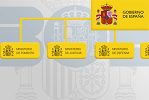-
Atención e información


-
Empleo público

-
Ayudas
-
Trámites y Servicios Electrónicos
-
Administración Pública y Estado


-
Tu espacio europeo
Atención e información


Empleo público

Ayudas
Trámites y Servicios Electrónicos
Administración Pública y Estado


Tu espacio europeo

